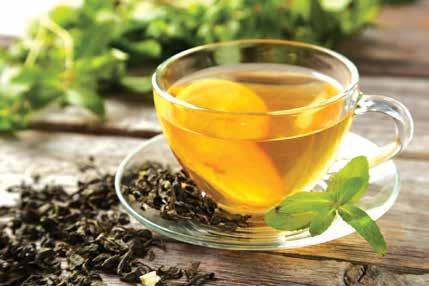
6 minute read
Spilling the Tea on Health Benefits by Aliza Beer, MS RD CDN
Health & F tness
Spilling the Tea on Health Benefits
By Aliza Beer MS, RD, CDN
People have been drinking tea for thousands of years, and it is revered as a cure-all in many Asian countries. Numerous studies have shown that tea may boost the immune system, fight off inflammation, help control diabetes, encourage weight loss, lower cholesterol, and help prevent cancer and heart disease. While some brews provide more health benefits than others, there’s plenty of evidence that regularly drinking tea can have a lasting impact on your health and wellness. Most registered dietitians agree that any tea is a good tea, and there is no downside to drinking it.
There are two main categories of tea: true tea and herbal tea. True teas are made using the leaves of the tea plant known as Camillia Sinensis. These teas include green tea, white tea, oolong tea, pu-erh tea, and black tea. While these teas are made using the same leaves of the plant, the difference in color and taste arises from the production process. Green tea and white tea undergo the least amount of processing and are not oxidized. As a result, these teas retain their natural green color and are considered to be among the healthiest teas. The caffeine content of true teas varies between the different types and on how they were produced.
Herbal teas are made by infusing fruits, roots, herbs, leaves, and stems of a variety of plants. Some of the most popular herbal teas include ginger tea, peppermint tea, and chamomile tea. Herbal teas do not contain any caffeine.
Let’s discuss some important health benefits found in the most popular teas.
• Protects Heart Health:
Recent research shows that tea drinking may significantly lower the risk of serious heart disease including heart attack and blood clots. Tea contains anti-inflammatory properties that help to soothe tissue in arteries. This helps to minimize the risk of inflammation that can restrict blood circulation and cause clotting. In fact, those anti-inflammatory properties can be used in other ways as well. Black tea can be steamed and cooled and then pressed on minor cuts, scrapes, and bruises to relieve pain and reduce swelling. A black tea bath can also ease inflammation caused by skin rashes and conditions such as poison ivy.
• Boosts Energy: True teas contain caffeine, with black tea containing the most. Just for reference, one 8-ounce cup of coffee contains about 95 mg of caffeine, while one 8-ounce cup of black tea contains 48 mg, and green tea 29 mg. The low caffeine content in tea makes tea a good choice for people who are looking to cut back on their caffeine intake.
Green tea and oolong tea also contain an amino acid known as L-theanine. This amino acid slows the absorption of caffeine. As a result, the energy boost from these teas is longer lasting and more steady than a cup of coffee. You’ll get the increased focus and energy without the jittery side effects or the crash when the caffeine wears off. L-theanine also increases alpha waves in the brain, helping to increase focus while at the same time offering calming and relaxing effects.
• May Aid Weight Loss:
Green tea in particular may help accelerate weight loss. Green tea contains amino acids that signal the body to burn stored fat. Tea will also help keep you hydrated and may satisfy a sweet tooth.
Tea is a calorie-free drink, so if you replace sugary sodas and juices with tea, you will cut calories and reach your fitness goals sooner.
• Supports Mental Health:
Regular tea consumption has been linked to lower risk of neurological disease and decreased stress levels. Scientist have found that the amino acid L-theanine may help prevent cognitive diseases such as Parkinson’s and Alzheimer’s diseases. Tea offers natural calming effects that can reduce stress and help you unwind at the end of the day.
Tea contains antioxidants that work to prevent oxidative stress, which can damage healthy cells. Oxidative stress has been linked to dementia and depression. Antioxidants also help cleanse the body of toxins that cause mental health problems. Tea drinkers have been shown to have lower stress levels and improved overall health with regular consumption. • Aids Digestion: Tea helps streamline digestion and can treat a host of issues ranging from nausea and upset stomach to diarrhea and constipation. Ginger tea is an herbal tea that has long been used in China and India to treat an upset stomach.
The ingredients gingerol and shogaol help to sooth the stomach lining to prevent vomiting. Peppermint tea also helps soothe an upset stomach because it contains high levels of antioxidants and menthol. Tea also contains tannins, which have been shown to reduce intestinal inflammation. This can help soothe stomach cramps and treat irritable bowel syndrome. • May Regulate Blood Sugar: Black tea has been shown to reduce blood sugar levels after eating a meal. The effects were demonstrated for up to 2 hours after meal consumption. Researchers attribute these health benefits to the polyphenols in tea. These polyphenols have anti-inflammatory and antioxidant powers. Green tea, because it is not oxidized, contains the highest concentration of polyphenols from all the teas.
When researchers followed groups of people for long periods, they found that tea drinkers are less likely over time to develop diabetes, compared with people who drink less tea. • Cancer Connection: Research has found that green tea has a possible impact on liver, breast, prostate, and colorectal cancers.
In recent years, matcha, a form of green tea, has become very popular. Matcha is a very fine, high quality green tea powder made from the entire leaves of tea bushes grown in the shade. Since it is the only form of tea in which the leaves are ingested, matcha contains even more antioxidants than green tea. It has been suggested that one cup of matcha is equivalent to 10 cups of regular green tea!
While the majority of teas are beneficial for your health, there are some that should be avoided. Teas la-
beled as “detox teas” for fad diets are usually laced with laxatives and can be harmful to your health. Fancy tea lattes from chain stores usually contain a healthy tea base but are loaded with sugar.
Some herbal teas may potentially trigger allergies. Many herbal teas contain different types of fruits, herbs, spices, and flowers that some people are allergic to. If you have allergies, always read the ingredients on the package before you consume a new herbal tea.
The benefits of drinking tea go far beyond simply feeling better when you are sick. Drinking tea can help protect brain health, improve heart health, and may even help prevent certain types of cancer. Explore your tea options and experiment with different flavors. The potential health benefits of tea are substantial, delicious, and easily obtainable.
Go grab a mug and drink to your health!
Aliza Beer is a registered dietitian with a master’s degree in nutrition. She has a private practice in Cedarhurst, NY. Patients’ success has been featured on the Dr. Oz show. Aliza can be reached at alizabeer@gmail.com, and you can follow her on Instagram at @alizabeer












